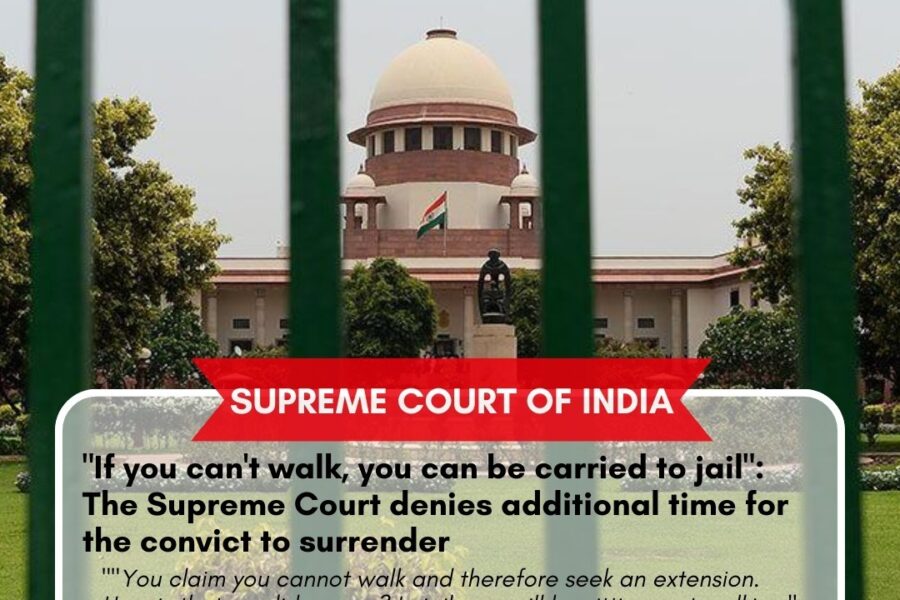Mohammad Umeedullah Khan v. State of Telangana
INTRODUCTION
On 3rd June 2024, the Supreme Court dismissed the plea of a trial court convict seeking extension of time to surrender before the trial court. The Court remarked that if you can’t walk, you can be carried to jail. The case was presented before the vacation bench of Justice Sanjay Kumar and Justice Augustine George Masih. The article will further analyze the facts and judgment of the case. The accused was represented by advocate Lfazeer Ahmad. He filed the plea for extension of time on 21 May 2024 after the High Court of Telangana had upheld the judgment of the trial court.
BACKGROUND
The petitioner, who was a B. Tech student was accused of attempt to murder of a student of some other college after they had a sudden fight. It was contended that the person had used a gun to kill the other person. This incident had taken place in the year 2007 and in 2013, the trial court convicted the accused for 10 years of imprisonment and also had ordered on him a fine. He was held under section 307 of Indian Penal Code and under sections 25(1A) and 27 of the Arms Act of 1959. On 30 April 2024, in deciding upon the petition, The High Court of Telangana upheld the judgment of the trial court and had ordered that the petitioner shall surrender to trial court within 2 weeks. The petitioner had then applied in the Supreme Court.
SECTION 307 IPC
Section 307 of IPC lays down the provision for the offence of attempt to murder it provides that if the person acts in such a way that his acts are likely to cause death of the person injured and if such injury occurs to the person then the person shall be liable for the offence of attempt to murder. The section makes a provision that the person shall be given imprisonment for a period that may extend upto 10 years and shall also be liable for a fine.
SECTION 25(1A) OF ARMS ACT OF 1959
This section lays down that a person who carries arms in contravention to section 7 of the Act then it he shall be punishable with imprisonment for a term not less than 5 years and it may extend to 10 years and also liable to fine.
SECTION 27 OF ARMS ACT OF 1959
Section 27 of the Act also provides that if a person uses any arms or ammunitions in contrary to section 5 or section 7 of the Act then that person shall be liable for imprisonment for the term specified in the section.
JUDGMENT
The Supreme Court on 3rd June 2024 adjudged on the plea for extension of time to surrender before the trial court. The court dismissed the plea while commenting that in jail one has to sit and not walk. The court explained this to the advocate who had presented the medical reports of the petitioner that he was paralyzed and could not walk. Justice Sanjay Kumar said, “once this court had said that you have to surrender in two weeks, then you have to surrender. If you cannot walk, you can be carried to jail. This is no reason to seek extension of time to surrender. You can be transported, there is no need to walk.” The court finally dismissed the plea of extension of time to surrender before the trial court and mandated the petitioner to surrender.
CONCLUSION
The Supreme Court through this order reinstated the mandatory obedience of the judgments given by the courts. The dismissal of the plea has made it clear that pointless excuses to avoid the execution of punishment shall not be given or not be entertained by the courts. These excuses should be set aside and the distribution of justice should be the main focus in adjudicating on pleas like this.
Ishita Saxena (Legal Intern)

